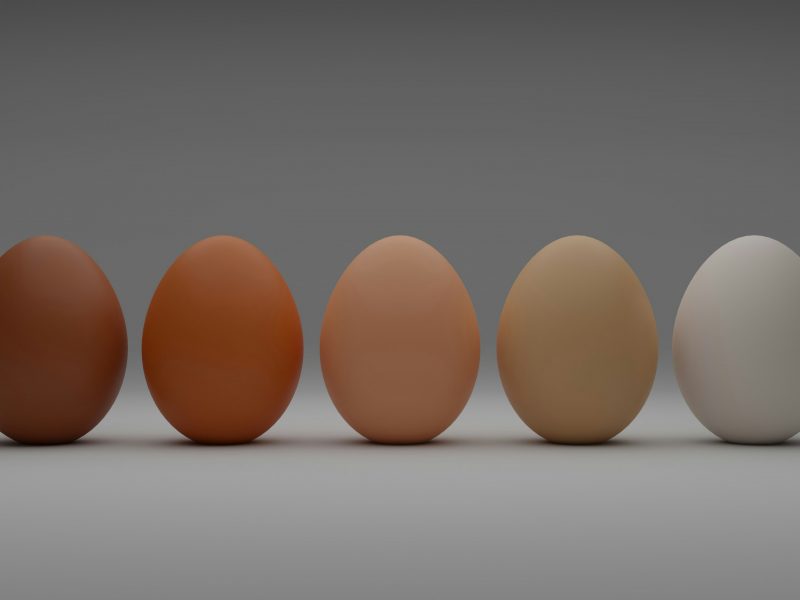Choline is an organic, water-soluble compound that is neither a vitamin nor a mineral. However, it is often grouped with the B vitamins due to its similar functions. In 1998, the Institute of Medicine officially recognised choline as an essential nutrient necessary for maintaining optimal health.
In this blog, we will look at the importance of choline and the various foods that are rich in this essential nutrient.
Why is Choline important?
Choline is an essential nutrient that plays a key role in various bodily functions, including:
Brain and Nervous System Function:
Choline is necessary for the production of acetylcholine, a neurotransmitter involved in memory, mood, and muscle control. It’s important if you suffer from any kind of anxiety, cognitive issues or nerve issues. Acetylcholine is essential for:
- Memory and Learning: As a neurotransmitter, acetylcholine facilitates communication between neurons, especially in areas of the brain related to memory and learning, such as the hippocampus. Adequate choline intake supports cognitive function and helps prevent age-related memory decline.
- Mood Regulation: Acetylcholine is also involved in mood regulation, helping balance emotional responses and maintain mental well-being. A deficiency in choline can lead to mood disorders, including anxiety and depression.
- Muscle Control: In the nervous system, acetylcholine transmits signals from nerves to muscles, controlling muscle contractions and coordination. Without sufficient choline, muscle function may be impaired, leading to weakness or fatigue.
- Neurodevelopment: During pregnancy and early childhood, choline is essential for proper brain development. It helps form brain cells, promotes neuronal connectivity, and supports overall cognitive development in infants and children. Pregnant women with adequate choline intake are more likely to have children with healthy brain function and improved memory performance.
From a nervous system perspective, choline plays a crucial role in managing stress. As we know addressing stress is an important key aspect in managing histamine intolerance.
Read these 3 articles to learn more about the link between stress and histamine intolerance.
Histamine, Stress and the Histamine Bucket
The link – Histamine Intolerance and Stress
Anxiety & Histamine – Are they connected?
Methylation:
Choline plays a crucial role in the process of methylation, which is a biochemical reaction essential for various bodily functions. Methylation involves the transfer of a methyl group (one carbon and three hydrogen atoms) to other molecules, such as DNA, proteins, and lipids. This process is critical for:
DNA Synthesis and Repair: Methylation ensures proper gene expression and the maintenance of genetic stability. It helps regulate which genes are turned on or off, affecting cellular function and overall health.
Detoxification: Methylation supports the detoxification process, especially in the liver, by converting harmful compounds into less toxic substances that can be safely eliminated from the body. This also relates to heavy metals like mercury, lead, and cadmium which can accumulate in the body, posing risks to organs and systems, particularly the brain, liver, and kidneys. Choline contributes to mitigating these effects also.
Neurotransmitter Production: Methylation is involved in synthesizing important neurotransmitters like serotonin, dopamine, and melatonin, which influence mood, sleep, and mental health.
Choline contributes to methylation by acting as a precursor for the production of betaine, which donates methyl groups in the liver. Choline can also be converted into phosphatidylcholine, which is vital for cell membrane integrity and lipid transport.
Without sufficient choline, the body may struggle to maintain proper methylation, leading to issues such as DNA damage, increased risk of cardiovascular disease, cognitive decline, and liver problems.
Liver Function:
Choline helps prevent fat accumulation in the liver and supports proper liver function.
Fat Metabolism and Transport: One of choline’s primary functions in the liver is to assist in the transport and metabolism of fats. It is a precursor to phosphatidylcholine, a type of phospholipid that is a major component of very-low-density lipoproteins (VLDLs). VLDLs help transport fats, including triglycerides, out of the liver to be used or stored by other tissues. Without sufficient choline, fat can accumulate in the liver, leading to a condition known as non-alcoholic fatty liver disease (NAFLD).
Preventing Fatty Liver: Choline helps prevent the buildup of fats within liver cells by facilitating their export. A deficiency in choline can result in fat deposition in the liver, which impairs its function and may lead to inflammation, liver damage, or scarring, a condition known as steatohepatitis.
Detoxification: Choline is also involved in the liver’s detoxification processes. Through its role in methylation, choline helps the liver process and remove toxins and metabolic waste products from the body. This helps maintain overall liver health and supports its role as the body’s primary detoxifying organ.
Cell Structure:
It is a component of phospholipids, which are vital for maintaining the integrity and structure of cell membranes. Choline also helps maintain the integrity of cell membranes in the nervous system by forming phospholipids like phosphatidylcholine, which are crucial for protecting neurons and promoting efficient signal transmission. This structural support helps preserve cognitive function and reduces the risk of neurodegenerative diseases, such as Alzheimer’s.
Pregnancy and Infant Development:
Choline is particularly important during pregnancy as it supports brain development and helps prevent neural tube defects.
Menopause and Oestrogen:
During menopause, the decline in oestrogen can affect cognitive function, mood, liver health and cellular integrity. Choline can help with all of these.
However, it’s important to note that the decline in oestrogen can impact choline production through the following ways:
- Reduced Efficiency in Choline Conversion: Oestrogen influences the metabolism of choline and its conversion into other important compounds. Lower oestrogen levels can reduce the efficiency of these processes, potentially leading to lower levels of key choline-derived molecules like phosphatidylcholine and acetylcholine.
- Impact on Acetylcholine Production: Oestrogen has been shown to affect the synthesis and release of acetylcholine, a neurotransmitter crucial for cognitive function and mood regulation. With decreased oestrogen, the production of acetylcholine can be compromised. Since choline is a precursor to acetylcholine, reduced estrogen levels can lead to insufficient acetylcholine, affecting memory, learning, and emotional stability.
- Decreased Phosphatidylcholine Levels: Oestrogen plays a role in maintaining cellular membranes and lipid metabolism. When we have decreased oestrogen, the synthesis of phosphatidylcholine—a major component of cell membranes and important for liver function—can be impaired. This reduction can affect the structural integrity of cell membranes and the efficiency of liver detoxification processes.
- Increased Risk of Choline Deficiency: The combined effects of impaired choline metabolism and reduced oestrogen levels can increase the risk of choline deficiency. This deficiency can contribute to various health issues, including cognitive decline, mood disturbances, and liver dysfunction.
Given these factors, it is important for women in peri-menopause or menopause to ensure they are getting sufficient choline through their diet or supplements.
Where does Choline come from?
Although your body produces small amounts of choline, it’s often not sufficient to meet your needs, making it essential to obtain additional amounts through your diet.
Here are some foods that are high in choline:
Eggs:
Eggs are among the richest sources of choline. It’s important to note that raw egg whites can be a histamine liberator for some people. The good news is that the yolk has all the choline! Therefore people with an egg intolerance may find they are ok with the yolk as it’s usually the white they have an issue with. Tip: You can wisk an egg yolk into your oatmeal to increase your choline intake!
Organ meats
Organ meats can also be a good source of choline. Things like liver and kidneys. These are also high in iron, B12, folate, vitamin Q, copper and selenium. For histamine intolerance, ensure that these meats are fresh. You can make home made chicken liver pate and store it in small portions in the freezer.
Cavier (Fish Roe) & Fish
Cavier or fish roe is a good source of choline. Same as fish, for histamine intolerance, ensure that these are as fresh as possible.
Likewise, fish including salmon, tuna and cod are also good sources of choline. Ensure that the fish you consume is as fresh as possible or frozen quickly from catch to avoid histamine flare-ups.
Beef
Beef is a good source of choline.
For those with histamine intolerance, fresh unaged beef is best. Ask your butcher how long items have been aged. Ask to grind the mince in the store or mince yourself. Shoulder cuts, diced beef and joints are usually fresh, check with your butcher. Aim to get grass-fed beef as this has higher amounts of nutrients and more omega 3 fatty acids.
Chicken
Chicken is a good source of choline. However, it also produces histamine quickly, so best to use quick cooking methods like frying, short roasting times or steaming. Plus, buy chicken fresh and eat or freeze that day.
Cruciferous vegetables:
The good news is that some vegetables also contain choline. These are the cruciferous vegetables. For those with histamine intolerance, cauliflower and broccoli are the ones to include in your diet.
Quinoa
Quinoa is a gluten-free ingredient that can be used in many ways. It also contains choline, so it can be included in meals to bump up your choline intake.
Aim to eat a variety of these ingredients, to ensure that you consume enough choline in your diet. If you are unsure, then speak with your nutritionist about your choline intake and whether you may need to also supplement this important nutrient.
So as you can see, choline is an essential nutrient that plays a vital role in various bodily functions, from supporting brain and nervous system health to aiding in detoxification, methylation, liver function, and cellular structure. While your body can produce small amounts, it’s important to get choline from your diet to meet your needs. Incorporating choline-rich foods like eggs, organ meats, fish, and cruciferous vegetables can help ensure you maintain optimal levels for overall health and well-being.

Do you want to learn how to eat an anti-inflammatory, gut-healing, low-histamine diet the right way?
With easy recipes, meal plans, handouts, and everything you need in a self-paced course – start the Easy Low Histamine Diet Kickstart course today.
Reduce your symptoms with delicious food and eat with ease.

 Digestive Enzymes and Histamine Intolerance
Digestive Enzymes and Histamine Intolerance